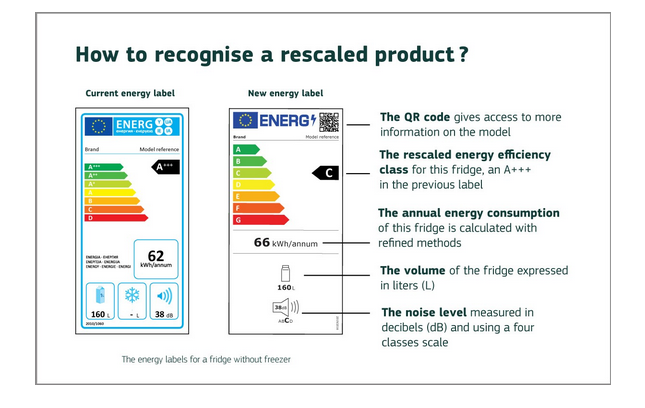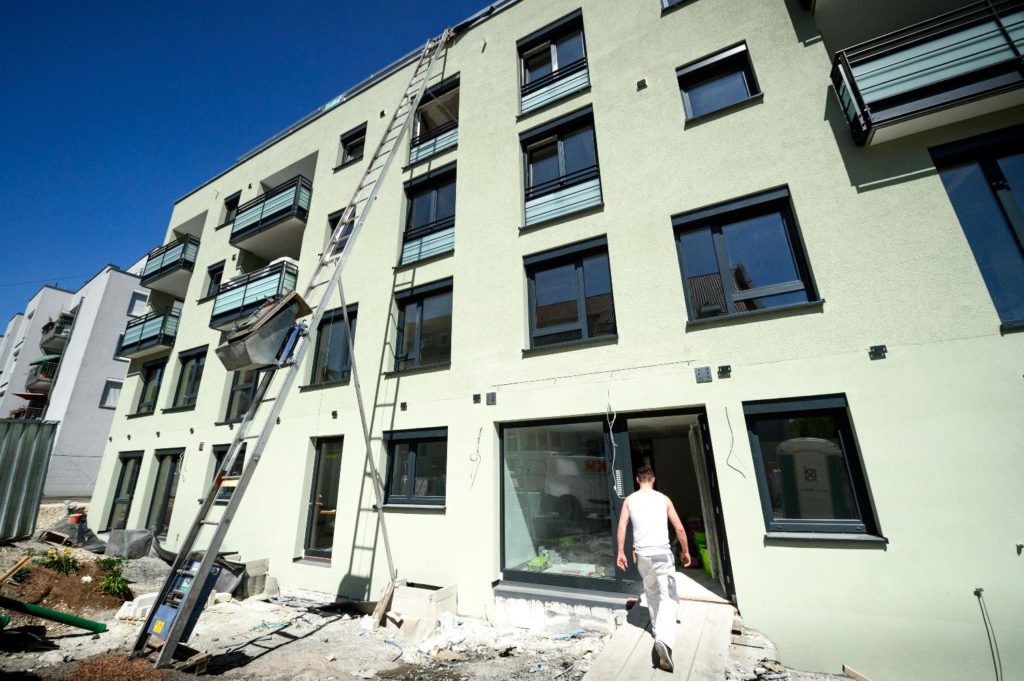Everything that changes in Germany in March 2021

From a plan to relax Covid-19 restrictions to the Baukindergeld deadline, here are the changes in Germany you should look out for starting on Monday, March 1st.
Roadmap out of lockdown expected - and time for a haircut
Tough coronavirus restrictions are in place in Germany until at least March 7th. However, schools have already gradually started returning and hairdressers are set to reopen on March 1st.
Chancellor Angela Merkel and state leaders will meet on March 3rd to discuss the next steps. It's expected they will announce a roadplan for states to come out of the shutdown, although it will be based on the infection situation, and how the variants are spreading.
Some states are already beginning to loosen more measures. Bavaria, for example, plans to open flower shops and garden centres in March in time for spring.
READ ALSO:
- Is this Germany's step-by-step plan to come out of lockdown?
- State by state: What are Germany's plans to gradually open up?
Change in energy labels
The energy labels for electrical appliances are changing. Germany, and other EU countries, are getting rid of the labels A+, A++ and A+++. Instead, they will in future only range from G, for less environmentally friendly appliances, to A for very energy-efficient models.
At the same time, the classifications will be tightened. According to the Federal Association of Consumer Centres, previous appliances with the A+++ label will likely reach class C in future. The best class, A, will remain empty for the time being, so that manufacturers have an incentive for innovation.

Source: EU commission
Blue insurance plates
From March 1st, vehicles such as mopeds and electric scooters, will need a new insurance number plate. And from this date, only blue licence plates will be allowed. Anyone who still rides with an old black licence plate after this deadline may be prosecuted - and will not be insured in the event of damage.
A new feature this year is that the licence plates no longer have to be made of aluminium or sheet metal. Some insurance companies also offer them as adhesive foil.
Baukindergeld deadline
Parents who still want to secure Baukindergeld must obtain a building permit or buy a property before the grant project comes to an end on March 31st 2021. You must then apply for the Baukindergeld allowance no later than six months after moving in. The last possible date for submitting the application is December 31st 2023.
The Baukindergeld was launched to make it easier for families (including single parents) with one or more children to build their first new home or buy real estate. Through the programme, families can receive a subsidy of €1,200 per child per year over 10 years.

A house being built in Stuttgart. Photo: DPA
Don't hedge your bets on cutting
If you live in Germany, you'll be aware that people are very fond of rules. So maybe it comes as no surprise that there's a rule on hedge cutting during the spring and summer months (yes really).
Between March 1st and September 30th you are not allowed to cut a hedge heavily, according to the Federal Nature Conservation Act.
During this period no large cuts are allowed on “hedges, living fences, bushes and other woody plants,” stipulates the law. Rather, only “gentle pruning” is permitted, with larger work only allowed starting at the beginning of October. The aim of the law is to protect the animals and birds that tend to call these green spaces home in the spring and summer.
Spring is coming (along with a time change)
You'll be glad to know that winter is almost at an end. March 1st is the meteorological start of spring in 2021, but the "real" start of spring is a little later, on March 20th.
Meanwhile, get ready to lose an hour's sleep: the 2021 time changeover to Daylight Savings is scheduled for the early hours of March 28th. The clock will be moved forward by one hour from 2 to 3am, which means the night will be shorter. The changeover means it will be darker in the morning, but light will last longer in the evening.
Berlin public holiday
Most people living in the city state of Berlin can enjoy a day off on March 8th for Frauentag (Women's Day). That falls on a Monday this year - so most people will get a day off for it. The Feiertag, launched in 2019, means Berlin now has 10 official holidays. Although this year, sadly, many holidays fall on weekends which means most workers do not get a day off work for them.
Bavaria is the state with the most public holidays - it has 13 in total.
READ ALSO: German word of the day - Frauentag
Stamps getting even more digital
From March, more stamps will be kitted out with individual matrix codes to help stop letters getting lost in the mail.
The codes, which are similar to QR codes, are placed alongside traditional images is billed as “a new generation of stamps”, according to Deutsche Post which launched the initiative in February.
By 2022 they will feature on all stamps in Germany.
READ ALSO: 'A new generation of stamps': Deutsche Post rolls out QR-style tracking codes
Germany's huge political year officially kicks off
Germany's Superwahljahr (or super election year) officially starts on March 14th with state elections in Rhineland-Palatinate and Baden-Württemberg.
About 3.1 million voters will head to the polls in Rhineland-Palatinate to elect a new state parliament.
We'll find out if Social Democrat state premier Malu Dreyer is to remain in office for another five years - or if her CDU challenger Christian Baldauf succeeds after 30 years of SPD-led state governments.
In Baden-Württemberg, the current government is a coalition of the Greens and the CDU, led by state premier Winfried Kretschmann. In the previous election held in March 2016, The Greens became the largest party for the first time in any German state, winning more than 30 percent of votes cast.
In addition to these states, voters in Thuringia, Saxony-Anhalt, Mecklenburg-Western Pomerania, and Berlin will all cast ballots this year. There's also a federal election in autumn, where Chancellor Angela Merkel is to stand down.
Pension news
Retired people in western Germany will see no increase in their pension payments this year. One reason, according to German media, is due to the Coronavirus crisis which has seen many employees go on Kurzarbeit (reduced working hours). This puts pressure on the system and affects wage growth. It's the first time there's been no annual pension increase since 2010.
Pensioners in the eastern federal states will see an increase of at least 0.7 percent from July 1st. However a final decision on the increase will not be made until March 2021 when all the data is available.
We updated this story on March 2nd to include information about the upcoming state election in Baden-Württemberg.
Comments
See Also
Roadmap out of lockdown expected - and time for a haircut
Tough coronavirus restrictions are in place in Germany until at least March 7th. However, schools have already gradually started returning and hairdressers are set to reopen on March 1st.
Chancellor Angela Merkel and state leaders will meet on March 3rd to discuss the next steps. It's expected they will announce a roadplan for states to come out of the shutdown, although it will be based on the infection situation, and how the variants are spreading.
Some states are already beginning to loosen more measures. Bavaria, for example, plans to open flower shops and garden centres in March in time for spring.
READ ALSO:
- Is this Germany's step-by-step plan to come out of lockdown?
- State by state: What are Germany's plans to gradually open up?
Change in energy labels
The energy labels for electrical appliances are changing. Germany, and other EU countries, are getting rid of the labels A+, A++ and A+++. Instead, they will in future only range from G, for less environmentally friendly appliances, to A for very energy-efficient models.
At the same time, the classifications will be tightened. According to the Federal Association of Consumer Centres, previous appliances with the A+++ label will likely reach class C in future. The best class, A, will remain empty for the time being, so that manufacturers have an incentive for innovation.

Source: EU commission
Blue insurance plates
From March 1st, vehicles such as mopeds and electric scooters, will need a new insurance number plate. And from this date, only blue licence plates will be allowed. Anyone who still rides with an old black licence plate after this deadline may be prosecuted - and will not be insured in the event of damage.
A new feature this year is that the licence plates no longer have to be made of aluminium or sheet metal. Some insurance companies also offer them as adhesive foil.
Baukindergeld deadline
Parents who still want to secure Baukindergeld must obtain a building permit or buy a property before the grant project comes to an end on March 31st 2021. You must then apply for the Baukindergeld allowance no later than six months after moving in. The last possible date for submitting the application is December 31st 2023.
The Baukindergeld was launched to make it easier for families (including single parents) with one or more children to build their first new home or buy real estate. Through the programme, families can receive a subsidy of €1,200 per child per year over 10 years.

A house being built in Stuttgart. Photo: DPA
Don't hedge your bets on cutting
If you live in Germany, you'll be aware that people are very fond of rules. So maybe it comes as no surprise that there's a rule on hedge cutting during the spring and summer months (yes really).
Between March 1st and September 30th you are not allowed to cut a hedge heavily, according to the Federal Nature Conservation Act.
During this period no large cuts are allowed on “hedges, living fences, bushes and other woody plants,” stipulates the law. Rather, only “gentle pruning” is permitted, with larger work only allowed starting at the beginning of October. The aim of the law is to protect the animals and birds that tend to call these green spaces home in the spring and summer.
Spring is coming (along with a time change)
You'll be glad to know that winter is almost at an end. March 1st is the meteorological start of spring in 2021, but the "real" start of spring is a little later, on March 20th.
Meanwhile, get ready to lose an hour's sleep: the 2021 time changeover to Daylight Savings is scheduled for the early hours of March 28th. The clock will be moved forward by one hour from 2 to 3am, which means the night will be shorter. The changeover means it will be darker in the morning, but light will last longer in the evening.
Berlin public holiday
Most people living in the city state of Berlin can enjoy a day off on March 8th for Frauentag (Women's Day). That falls on a Monday this year - so most people will get a day off for it. The Feiertag, launched in 2019, means Berlin now has 10 official holidays. Although this year, sadly, many holidays fall on weekends which means most workers do not get a day off work for them.
Bavaria is the state with the most public holidays - it has 13 in total.
READ ALSO: German word of the day - Frauentag
Stamps getting even more digital
From March, more stamps will be kitted out with individual matrix codes to help stop letters getting lost in the mail.
The codes, which are similar to QR codes, are placed alongside traditional images is billed as “a new generation of stamps”, according to Deutsche Post which launched the initiative in February.
By 2022 they will feature on all stamps in Germany.
READ ALSO: 'A new generation of stamps': Deutsche Post rolls out QR-style tracking codes
Germany's huge political year officially kicks off
Germany's Superwahljahr (or super election year) officially starts on March 14th with state elections in Rhineland-Palatinate and Baden-Württemberg.
About 3.1 million voters will head to the polls in Rhineland-Palatinate to elect a new state parliament.
We'll find out if Social Democrat state premier Malu Dreyer is to remain in office for another five years - or if her CDU challenger Christian Baldauf succeeds after 30 years of SPD-led state governments.
In Baden-Württemberg, the current government is a coalition of the Greens and the CDU, led by state premier Winfried Kretschmann. In the previous election held in March 2016, The Greens became the largest party for the first time in any German state, winning more than 30 percent of votes cast.
In addition to these states, voters in Thuringia, Saxony-Anhalt, Mecklenburg-Western Pomerania, and Berlin will all cast ballots this year. There's also a federal election in autumn, where Chancellor Angela Merkel is to stand down.
Pension news
Retired people in western Germany will see no increase in their pension payments this year. One reason, according to German media, is due to the Coronavirus crisis which has seen many employees go on Kurzarbeit (reduced working hours). This puts pressure on the system and affects wage growth. It's the first time there's been no annual pension increase since 2010.
Pensioners in the eastern federal states will see an increase of at least 0.7 percent from July 1st. However a final decision on the increase will not be made until March 2021 when all the data is available.
We updated this story on March 2nd to include information about the upcoming state election in Baden-Württemberg.
Join the conversation in our comments section below. Share your own views and experience and if you have a question or suggestion for our journalists then email us at [email protected].
Please keep comments civil, constructive and on topic – and make sure to read our terms of use before getting involved.
Please log in here to leave a comment.